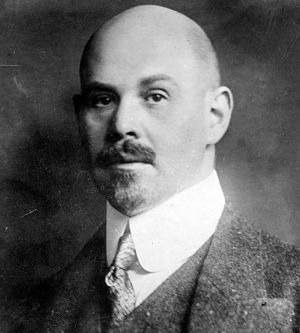Difference between revisions of "Walther Rathenau"
Jump to navigation
Jump to search
| Line 19: | Line 19: | ||
|start=1 February 1922 | |start=1 February 1922 | ||
|end=24 June 1922 | |end=24 June 1922 | ||
| − | |description=Assassinated in office after signing the [[Treaty of Rapallo]] with the [[USSR]]. | + | |description=Assassinated in office after signing the [[Treaty of Rapallo]] with the [[USSR]].}} |
}}'''Dr. Walther Rathenau''' was a German [[politician]]. | }}'''Dr. Walther Rathenau''' was a German [[politician]]. | ||
Revision as of 15:23, 7 January 2020
(industrialist, journalist, politician) | ||||||||||||
|---|---|---|---|---|---|---|---|---|---|---|---|---|
 | ||||||||||||
| Born | 29 September 1867 | |||||||||||
| Died | 24 June 1922 (Age 54) Berlin | |||||||||||
Cause of death | gunshot | |||||||||||
| Nationality | German | |||||||||||
| Parents | Emil Rathenau | |||||||||||
| Victim of | assassination | |||||||||||
German Foreign Minister assassinated in office after signing the Treaty of Rapallo with the USSR.
| ||||||||||||
Dr. Walther Rathenau was a German politician.
Career
An experienced journalist, Rathenau published in Berliner Tageblatt an article accusing his own country of manipulating politics in Vienna.
Rathenau initiated the Treaty of Rapallo, which removed major obstacles to trading with the USSR.
Assassination
On 24 June 1922, two months after the signing of the Treaty of Rapallo (which renounced German territorial claims from World War I), Rathenau was assassinated.
A Quote by Walther Rathenau
| Page | Quote | Date |
|---|---|---|
| Committee of 300 | “Earlier generations, the men of the industrial boom, were able to make themselves conquistadors; in our time with the strengthening of organizations, they themselves seek to secure successors who are familiar with the methods of leadership that have been established, with the art of staffing that has become practice. They, the results of a dangerous economic experiment, of a self-actuated selection, do not want to repeat the experiment with others; they do not look at successors as such, but at successors in their vicinity, in their circle, their offspring. In the most impersonal, democratic field of work, that of economic management, where every foolish word can compromise, every failure can topple, where the sovereign audience of a shareholders' meeting decides by statute on appointment and dismissal, an oligarchy has formed in the course of an age, as closed as that of ancient Venice. Three hundred men, all of whom know one another, guide the economic destinies of the continent and seek their successors from their own milieu. The strange causes of this strange phenomenon, which throws a glimmer into the darkness of future social development, are not here for consideration. The first question to be answered here is who it is: it is the offspring of urban origin, of normal education, of middle-class status, in short, the second or third generation of earners and leaders.” | 1912 |
Many thanks to our Patrons who cover ~2/3 of our hosting bill. Please join them if you can.